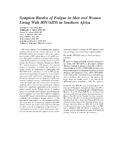The symptom experience of people living with HIV/AIDS in Southern Africa

View/
Date
2005Author
Voss, J.G.
Sukati, N.A.
Seboni, N.M.
Makoae, L.N.
Moleko, M.
Human, S.
Molosiwa, K.
Holzemer, W.L.
Publisher
Association of Nurses in AIDS Care. http://www.elsevier.com/wps/find/journaldescription.cws_home/704632/description#descriptionType
Published ArticleMetadata
Show full item recordAbstract
HIV-related fatigue is a debilitating and disabling
symptom that persists for months and years. In 743
HIV/AIDS patients from Southern Africa, the authors
found ratings of HIV-related fatigue to be highly prevalent.
The authors conducted a secondary data analysis
within the theoretical context of the University of California,
San Francisco Symptom Management Model.
The analysis focused on 538 patients who reported
fatigue to investigate correlates and predictors of
fatigue severity in relationship to demographic and
HIV/AIDS illness indicators, as well as HIV-specific
physical and psychological symptoms. A hierarchical
regression model explored the contributions of those
five blocks on fatigue severity. Of the 47% of the total
variance in fatigue severity, a combination of variables
within the health and illness block (6%), the physical
symptoms block (7%) and the psychological symptom
block (2%) contributed significantly to the increase in
fatigue severity scores. Fatigue severity in Southern
Africa was moderate, and the factors contributing to the
perceived fatigue were most likely related to symptoms
of acute HIV disease (such as fever and gastrointestinal
problems). In conclusion, fatigue severity is less
impacted by demographic or environmental variables
but much more by co-occurring symptoms and HIV
disease severity. The results of this study imply the need
for more research to understand if improvements in
water quality and access to food would prevent infection
and diarrhea and whether sufficient access to antiretroviral
treatments to manage the HIV infection would
improve fatigue and co-occurring symptom profiles.
